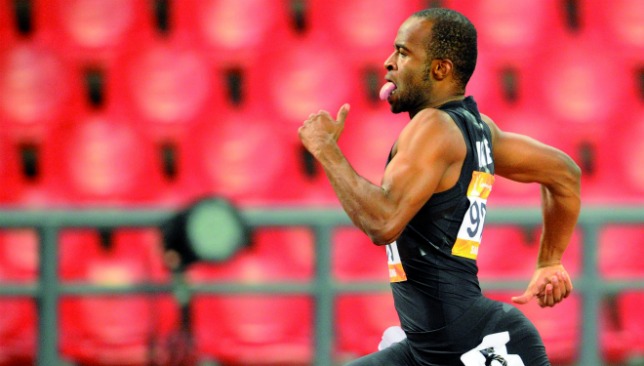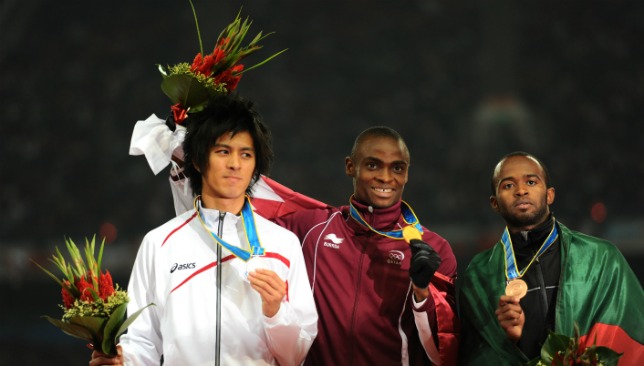
As the most successful sprinter in the history of the UAE, Omar Al Salfa has quite the peculiar track record.
One year he’s competing at the Olympic Games in Beijing, the next he’s making history as the first Emirati to qualify to the quarterfinals at the World Championships in Berlin, then 16 months later, he quits running for no apparent reason.
As a teenager, Al Salfa showed huge promise, taking 200m bronze at the Military World Games in 2007, and winning 200m gold in the Asian Junior Athletics Championships in Jakarta, Indonesia, in 2008, a few days after he placed seventh in the 200m final at the World Junior Athletics Championships in Bydgoszcz, Poland.
The following month, Al Salfa was lining up for the 200m heats at the Beijing Olympic Games.
It was formidable success considering he only took up running barely three years earlier.
“I always used to watch the 100m and 200m races on TV but I used to play football at Al Wasl. I loved football, and my grades at school started suffering because I was spending too much time playing football,” Al Salfa, 29, told Sport360.
“So I stopped football and I remember my PE teacher, Samer Kassar, may his soul rest in peace, is the reason why I started running.
“I was wearing a kandoora, and it was against the rules to play football while wearing a kandoora at school. So I would go play football when Captain Samer was away, in his office, and I would stop when he’d step outside.
“He caught me once and told me ‘come, you seem to be quite fast’. So I tried out for him on the track and he told me that he believed I could be an Asian champion one day.
“So I joined Al Ahli and started training there. A year later, I was already travelling with the national team.
“I used to like football a lot more but once you become successful at something, once you’ve won your first race, it’s impossible not to love running.”

Al Salfa on the podium after the men’s 200m race in Guangzhou in 2010.
Having made waves on the junior scene, Al Salfa says he was “surprised” when he found out he had been chosen to represent the UAE at the Beijing Olympics in 2008.
He didn’t make it through the preliminary heats but recalls it was an incredible experience at the famous Bird’s Nest.
“I remember watching Usain Bolt break the world record in the 100m and 200m, that was special,” Al Salfa says of his most special memories of the Games.
“The day I competed in the morning heats, there were 80,000 people in the stands because there was a Chinese hurdler scheduled to race right after my 200m heat, so it was a full house.
“I didn’t run my best time, it was my first time in a meet that huge and running in front of a crowd like that, so it wasn’t easy. But I came close to advancing to the next round.
“The opening ceremony was amazing. We met so many athletes that day. I took a photo with Kobe Bryant, I’m a big fan of his, and also with Bolt.”
While many up-and-coming athletes would find competing at the Olympics as a big motivational experience, Al Salfa actually wanted to quit the sport after Beijing.
He felt burnt out having spent a large stretch of time competing abroad, back-to-back, and said he didn’t have the necessary support from the sports entities at home.
“I felt that there was no support. I had a dream to win the Asian Championships (as a senior). But there was no attention or support, be it from my club, or from the UAE Athletics Federation.
“I wanted to quit after Beijing, but the head of the Federation told me that things would change and convinced me to continue.
42 sports, over 300 events! The excitement will be everywhere. Get your tickets at https://t.co/3GSHuNaMrYhttps://t.co/wAx6Q6SFOy
— Rio 2016 (@Rio2016_en) July 11, 2016
“So I started competing on the senior level but at first I wasn’t winning any medals, unlike my junior career.”
He won the 100m and 200m titles in a GCC competition in Saudi Arabia in 2009 before making that historic appearance at the Worlds in Berlin that summer, reaching the quarter-finals in the 200m.
Al Salfa then took 200m gold in the 2009 Asian Athletics Championships in Guangzhou, China.
“All the medals that I had won on the junior level, I really wanted to win them at the senior level, and I did,” he said.
“I must admit track and field is boring, it wasn’t easy to stay motivated doing all that running all the time. With every medal I won, I would consider quitting.
“And with the lack of support, I ended up just training once or twice a week while I’m in the UAE. They’d call me two months before a big meet and they’d tell me ‘good luck’ and that’s it. No proper preparation or anything.”
After claiming the bronze medal at the 2010 Asian Games, Al Salfa stepped away from the sport.
He stopped training and competing and dedicated himself to his job at the Dubai Civil Defense.
But last year, a surprise decision saw him return to the track and last April, he helped Al Ahli win the President’s Cup.
“I got bored without the sport, I missed the structure and the discipline of training,” explains Al Salfa.
“New challenges have also risen. A new champion had broken onto the scene here and they’re like ‘Omar cannot beat this guy’ so I figured I might as well show them that I can,” he added, refusing to name that “new champion”.
“My brother Bilal, who also runs, has encouraged me to return as well. And Captain Samer also pushed me to come back. He passed away earlier this year.
“Now I’m training even harder than before. I want to get back to competing on the international level and I’m targeting gold at the Asian Championships.”
But why did he not set the Rio 2016 Olympics as a target?
“That was surprising to a lot of people, but I know myself and there’s no point in going when I haven’t reached my best level yet,” he responds.
While Al Salfa has renewed his love and dedication to the sport, he is still unsure he will be getting the support he needs from the Federation to compete in international meets.
“With the current leadership at the federation, it’s not possible to compete internationally, I can only focus on the local competitions. But there are elections coming up and if there is a change, then I will think about it,” he had said after the President’s Cup last April.
“There is no support from the federation, we get more support from our clubs than the federation.
So many athletes quit the sport, former Arab and GCC champions, who stopped competing because of the lack of support. We need someone that values us as athletes and holds a position in the federation.
This federation doesn’t value the athletes. The reason I’m back is my club (Al Ahli), not the federation.”
There will be three athletes from the UAE competing in Rio this summer, Ethiopian-born duo Alia Saeed (10,00m) and Betlhem Belayneh (1,500m and 5,00m) and Al Nasr’s Mohamed Omar (hammer throw).